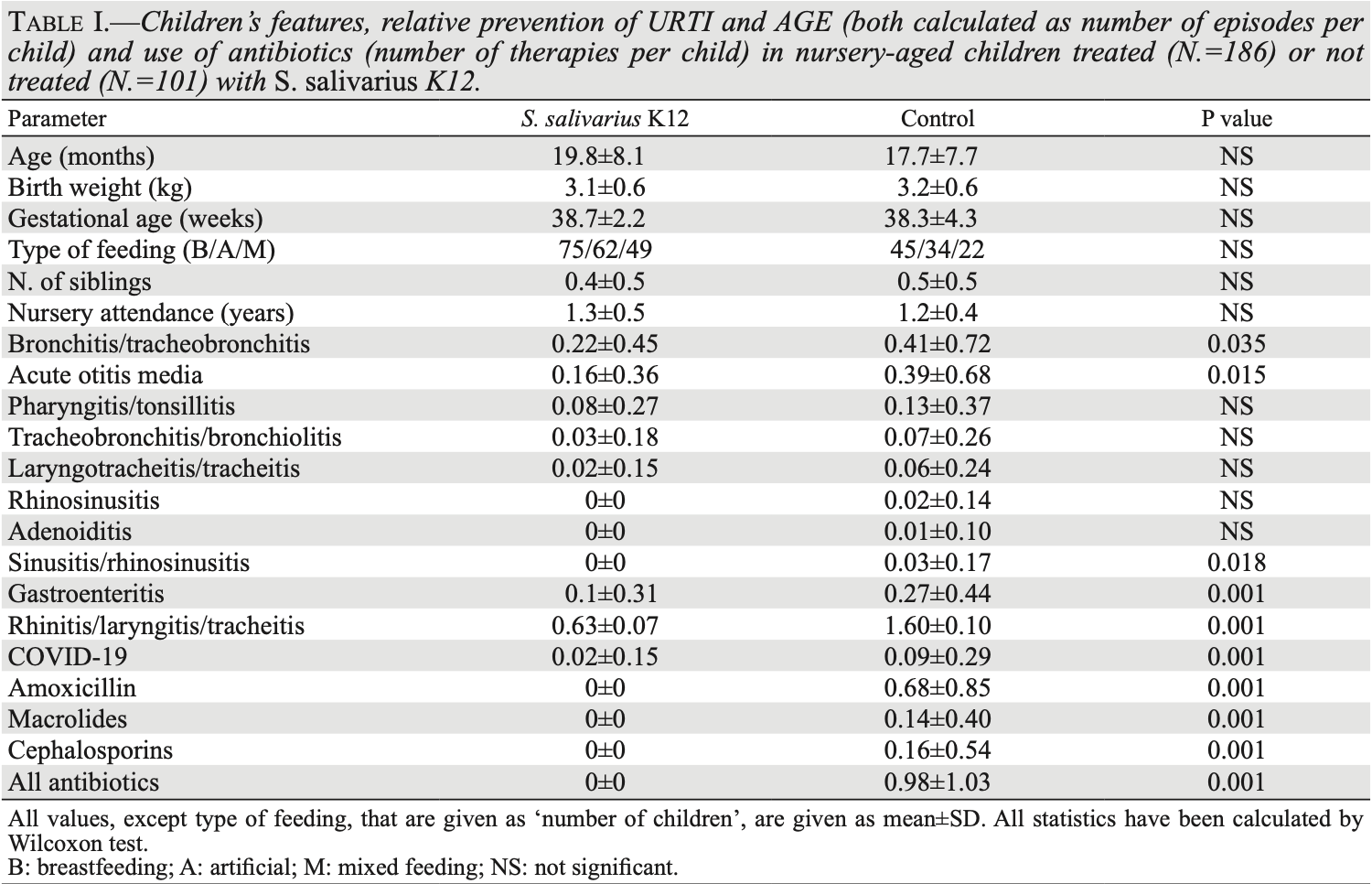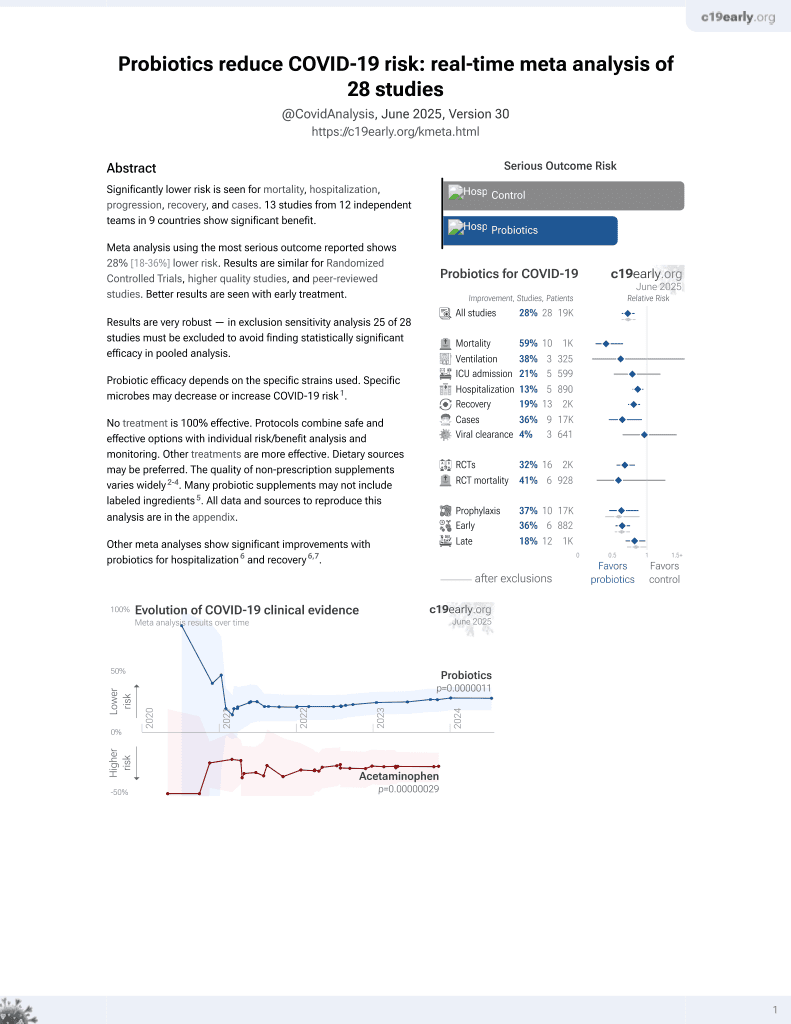
Role of S. salivarius K12 in the prevention of URTI and AGE in nursery-aged children
et al., Minerva Medica, doi:10.23736/S0026-4806.23.08920-6, NCT05840926, Sep 2023
Probiotics for COVID-19
20th treatment shown to reduce risk in
March 2021, now with p = 0.00000044 from 29 studies.
No treatment is 100% effective. Protocols
combine treatments.
6,400+ studies for
210+ treatments. c19early.org
|
Retrospective study of 287 nursery school children in Italy, 186 treated with S. salivarius K12 probiotic. The probiotic group had significantly lower rates of COVID-19, bronchitis, sinusitis, and laryngitis as well as lower antibiotic use. The study was registered retrospectively and details of COVID-19 diagnosis are not provided. Parents that administer the treatment may also use other treatments or take other actions that reduce risk for their children.
Probiotic efficacy depends on the specific strains used. Specific microbes may decrease or increase COVID-19 risk1.
|
risk of case, 77.8% lower, RR 0.22, p = 0.007, treatment mean 0.02 (±0.15) n=186, control mean 0.09 (±0.29) n=101.
|
| Effect extraction follows pre-specified rules prioritizing more serious outcomes. Submit updates |
Di Pierro et al., 30 Sep 2023, retrospective, Italy, peer-reviewed, 10 authors, study period January 2022 - March 2022, trial NCT05840926 (history).
Contact: f.dipierro@vellejaresearch.com.
Abstract: ©
This document is protected by international copyright laws. No additional reproduction is authorized. It is permitted for personal use to download and save only one file and print only one copy of this Article. It is not permitted to make additional copies (either sporadically
or systematically, either printed or electronic) of the Article for any purpose. It is not permitted to distribute the electronic copy of the article through online internet and/or intranet file sharing systems, electronic mailing or any other means which may allow access
to the Article. The use of all or any part of the Article for any Commercial Use is not permitted. The creation of derivative works from the Article is not permitted. The production of reprints for personal or commercial use is not permitted. It is not permitted to remove,
cover, overlay, obscure, block, or change any copyright notices or terms of use which the Publisher may post on the Article. It is not permitted to frame or use framing techniques to enclose any trademark, logo, or other proprietary information of the Publisher.
COPYRIGHT 2023 EDIZIONI MINERVA MEDICA
LETTERS TO THE EDITOR
© 2023 ediZiONi MiNerVa Medica
Online version at https://www.minervamedica.it
Minerva Medica 2023 Sep 28
dOi: 10.23736/S0026-4806.23.08920-6
role of S. salivarius K12
in the prevention of UrTi and aGe
in nursery-aged children
acute upper respiratory tract infections (UrTis) in
children are a major cause of morbidity, absence from
daily life and are among the most common reasons for
pediatrician visits.1, 2 any intervention that could prevent them would deliver important life-saving and costeffective impacts. despite their wide clinical use, the
evidence-based indications of probiotics are narrow and
mostly focus on the treatment of acute gastroenteritis
(aGe).3 indeed, the potential ability of probiotics to
influence and stabilize the gut microbiota, improving
its resistance to colonization, supports their rational
use.4 although the evidence for ability of probiotics to
also modulate immune functions is thought to be modest, it should nonetheless make the case for probiotics
to play a possible role in preventing and/or reducing
the symptoms of upper respiratory diseases.5 To date,
strains from Lactobacillus and Bifidobacterium spp. are
the most common probiotics used to treat a wide range
of diseases, ailments and conditions that affect humans
and animals.6 Much less common is the possibility of resorting to different bacterial species, such as Enterococcus faecium, endowed with well-documented clinical
anti-UrTi and anti-aGe properties.7 among the species less widely used as probiotics, the oral commensal
Streptococcus salivarius (Ss) is among the best studied,
with particular reference to the K12 strain.8 This strain
has been widely investigated, especially for its effective
action in fighting ear, oral, pharyngeal, and tonsillar infections caused by S. pyogenes, S. pneumoniae, M. catarrhalis, and/or H. influenzae.9 The effectiveness of the
Ss K12 is more commonly traced back to its ability to
release two antibiotics (Salivaricin a2 and Salivaricin
B), which are effective at damaging the membrane of
the target bacteria.10 However, the capacity of Ss K12
to counteract bacterial antagonists is not limited to the
release of bacteriocins. Other microbial species, nonsensitive to salivaricins a2 and B, including oral-pharyngeal viruses (syncytial virus, adenovirus, rhinovirus), fungi such as Candida, or..
DOI record:
{
"DOI": "10.23736/s0026-4806.23.08920-6",
"ISSN": [
"1827-1669"
],
"URL": "http://dx.doi.org/10.23736/S0026-4806.23.08920-6",
"author": [
{
"affiliation": [],
"family": "DI PIERRO",
"given": "Francesco",
"sequence": "first"
},
{
"affiliation": [],
"family": "GUASTI",
"given": "Luigina",
"sequence": "additional"
},
{
"affiliation": [],
"family": "ZERBINATI",
"given": "Nicola",
"sequence": "additional"
},
{
"affiliation": [],
"family": "BERTUCCIOLI",
"given": "Alexander",
"sequence": "additional"
},
{
"affiliation": [],
"family": "RISSO",
"given": "Paolo",
"sequence": "additional"
},
{
"affiliation": [],
"family": "DE PALMA",
"given": "Alessandra A.",
"sequence": "additional"
},
{
"affiliation": [],
"family": "CALLONI",
"given": "Arianna G.",
"sequence": "additional"
},
{
"affiliation": [],
"family": "LUKEZIC",
"given": "Monica",
"sequence": "additional"
},
{
"affiliation": [],
"family": "BAGGI",
"given": "Elena",
"sequence": "additional"
},
{
"affiliation": [],
"family": "COLOMBO",
"given": "Maria",
"sequence": "additional"
}
],
"container-title": "Minerva Medica",
"container-title-short": "Minerva Med",
"content-domain": {
"crossmark-restriction": false,
"domain": []
},
"created": {
"date-parts": [
[
2023,
9,
28
]
],
"date-time": "2023-09-28T15:32:24Z",
"timestamp": 1695915144000
},
"deposited": {
"date-parts": [
[
2023,
9,
28
]
],
"date-time": "2023-09-28T15:33:29Z",
"timestamp": 1695915209000
},
"indexed": {
"date-parts": [
[
2023,
9,
29
]
],
"date-time": "2023-09-29T16:45:40Z",
"timestamp": 1696005940786
},
"is-referenced-by-count": 0,
"issued": {
"date-parts": [
[
2023,
9
]
]
},
"link": [
{
"URL": "https://www.minervamedica.it/pdf.php?cod=R10Y9999N00A23092804",
"content-type": "unspecified",
"content-version": "vor",
"intended-application": "similarity-checking"
}
],
"member": "17149",
"original-title": [],
"prefix": "10.23736",
"published": {
"date-parts": [
[
2023,
9
]
]
},
"published-online": {
"date-parts": [
[
2023,
9
]
]
},
"publisher": "Edizioni Minerva Medica",
"reference-count": 0,
"references-count": 0,
"relation": {},
"resource": {
"primary": {
"URL": "https://www.minervamedica.it/index2.php?show=R10Y9999N00A23092804"
}
},
"score": 1,
"short-title": [],
"source": "Crossref",
"subject": [
"General Medicine"
],
"subtitle": [],
"title": "Role of S. salivarius K12 in the prevention of URTI and AGE in nursery-aged children",
"type": "journal-article"
}
